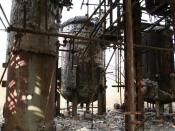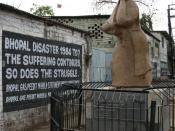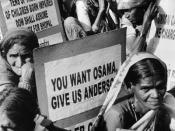ANALYSIS Union Carbide was a multinational corporation wielding influence in nations around the globe, with over 11,500 people in its employment worldwide. However, Union Carbide will not be remembered for its economic stimulation, not for any advances in chemistry, or job opportunities, it will be forever linked to the "Hiroshima of the Chemical Industry," the Bhopal disaster.
Union Carbide Corporation (UCC) seems to have successfully evaded its social obligations and responsibilities to the victims of Bhopal. True, a settlement between Union Carbide and the Indian government was formed. It is also true that the Indian government has set up warrants for the arrests of Union Carbide executives to be tried for murder. However, the reality of this faÃÂçade is that the Indian government set up warrants to appease its people rather than to actually follow through. The UCC's settlement was a pittance in comparison to the long-term effects and in comparison to their overall revenues.
In fact, after the settlement had been decided and established, UCC's stock actually went up $2 on the New York Stock Exchange. "The settlement of $470 million was equivalent to only $793 each for the 592,000 who had then filed claims. It was not even sufficient to cover health care and monitoring costs for the gas-exposed population, let alone economic rehabilitation or compensation for their suffering." Had this incident taken place in the United States, Union Carbide would have found itself bankrupt overnight and on its knees.
Being that the Bhopal plant produced less than 3 percent of Union Carbide's profits, it was conveniently ignored, machinery was left without maintenance or repair, employee morale was down, and safety measures and regulations thrown out in lieu of cutting costs. Profit maximization was the ultimate goal with utter disregard for the toxic and harmful nature of...


